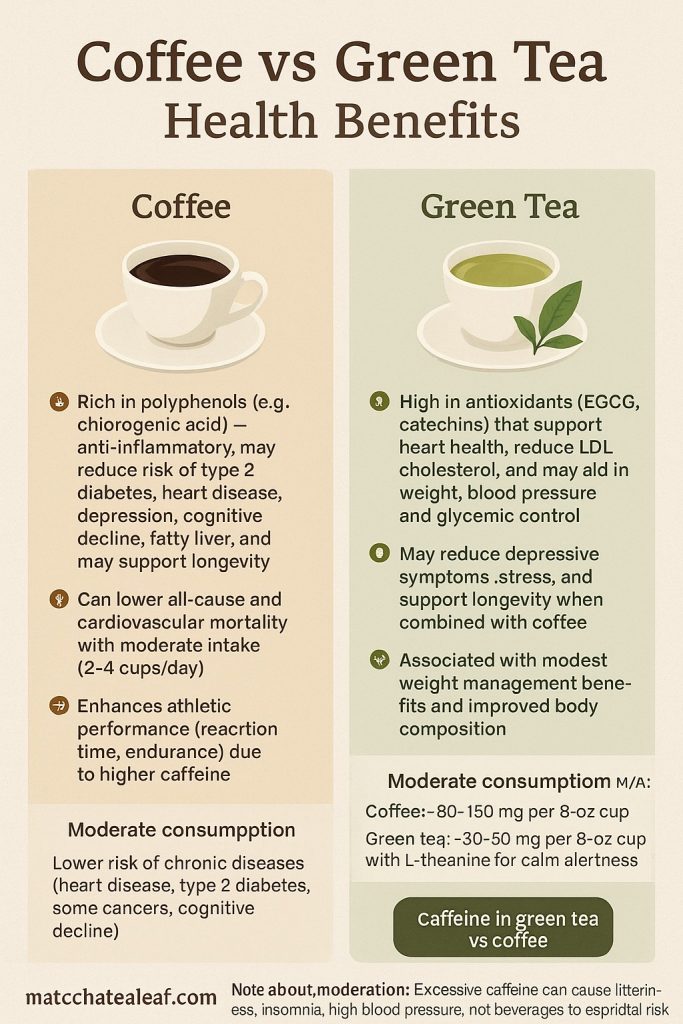When it comes to getting that morning energy boost, coffee and green tea are two of the world’s most popular beverages. While both contain caffeine, their caffeine content, health benefits, and effects on the body differ significantly.
So, it is very common query to know the amount of Caffeine in Green Tea vs Coffee. Understanding these differences can help you make an informed choice about which beverage better suits your lifestyle and wellness goals.
Caffeine in Green Tea vs Coffee: A Comparison
Coffee typically contains more caffeine than green tea per serving. An 8-ounce cup of brewed coffee contains between 95-200 mg of caffeine, while the same amount of green tea usually contains 25-35 mg. However, the caffeine in green tea is released more slowly into the bloodstream due to the presence of L-theanine, an amino acid that modulates caffeine absorption.
Factors Affecting Caffeine Levels
Several factors influence the caffeine content in both beverages-Green Tea & Coffee:
- Brewing method – French press vs. drip coffee; steeping time for tea
- Water temperature – Higher temperatures extract more caffeine
- Bean/leaf quality – Different varieties contain varying caffeine levels
- Serving size – Larger portions naturally contain more caffeine

Effects on the Body
While both beverages provide an energy boost, they affect the body differently. Coffee delivers a quick, intense burst of energy, often accompanied by increased alertness and potential jitters. Green tea, however, provides a more gentle, sustained energy increase without the common coffee crash. This is largely due to the combination of caffeine and L-theanine, which promotes a state of calm alertness.
Caffeine in Green Tea vs Coffee: Impact on Sleep and Anxiety
Coffee’s higher caffeine content can more significantly impact sleep patterns and may increase anxiety in sensitive individuals. Green tea’s lower caffeine content and the presence of theanine typically result in fewer sleep disruptions and reduced anxiety symptoms.
Health Benefits Beyond Caffeine
Both beverages offer unique health advantages beyond their caffeine content:
- Green Tea Benefits:
- Rich in antioxidants called catechins
- May boost metabolism
- Supports heart health
- Contains compounds that may prevent certain cancers
- Coffee Benefits:
- High in antioxidants
- May reduce risk of type 2 diabetes
- Potentially protective against liver disease
- May improve cognitive function
Making the Right Choice
Choosing between coffee and green tea depends on various personal factors:
- Desired energy level and duration
- Caffeine sensitivity
- Time of day
- Specific health goals
- Personal taste preferences
Both coffee and green tea offer valuable benefits, and the choice doesn’t have to be exclusive. Many people enjoy both beverages at different times of the day – perhaps coffee in the morning for an energy boost and green tea in the afternoon for sustained focus without sleep disruption.
Understanding the distinct characteristics of each beverage’s caffeine content and effects can help you optimize their use for your lifestyle and wellness objectives. Hope you understood the fact about the quantity and quality of Caffeine in Green Tea vs Coffee
✓ Expert Reviewed: This content has been reviewed by qualified professionals in the field.
Last Updated: September 11, 2025
Disclaimer: Content is for informational purposes only. Professional advice should be sought for specific situations.
Editorial Standards: The Tea Research Team at matchatealeaf.com unites premium tea industry professionals with advanced AI research tools to create deeply informed, engaging content on matcha, green tea, and black tea. Drawing from years of firsthand experience and global industry insight, the team blends tradition with technology, ensuring every article is accurate, inspiring, and rooted in genuine expertise—making us a trusted source for tea lovers worldwide. All content follows strict editorial guidelines with fact-checking and expert review processes. Read more about Tea Research Team